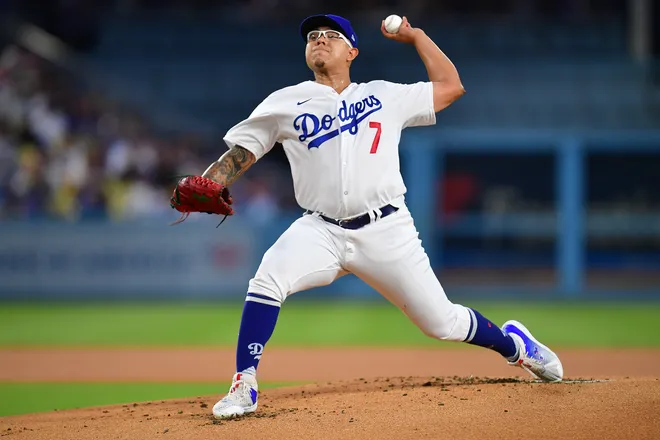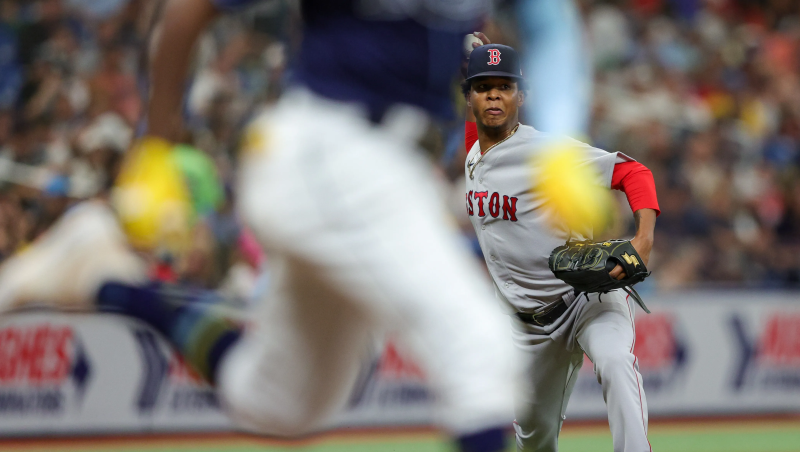Julio Urías said he'd grow as a person. His latest arrest paints a different reality.
After Julio Urías was arrested in May 2019 on suspicion of domestic battery following an incident in the parking lot of a Los Angeles mall, the L.A. city attorney’s office said it would not file charges against him, as long as the Dodgers pitcher participated in a 52-week domestic counseling program and committed no acts of violence for the next year.
When Major League Baseball suspended him for 20 games for that violation of its joint domestic violence policy, the Dodgers lauded the league’s action and said that “we are also encouraged that Julio has taken responsibility for his actions and believe he will take the necessary steps to learn from this incident.”
And Urías himself, while noting the incident had “no injury or history of violence,” said he understood major leaguers must be held to a higher standard. And that he’d “taken proactive steps to help me grow as a person on and off the field, and in my relationships.”
What a sad, sickening failure.

Sunday night, Urías was arrested and charged with felony corporal injury against a spouse, according to the Los Angeles Sheriff’s Department, citing an incident in the parking lot of BMO Stadium, where Urías and many other luminaries came to watch Lionel Messi and Inter Miami play soccer.
FOLLOW THE MONEY: MLB player salaries and payrolls for every major league team
And so, the well-worn process of MLB’s domestic violence adjudication begins again.
An investigation has begun. Administrative leave typically follows. Charges may stick or be dropped, often hinging on the desire or capacity of the alleged victim to cooperate with authorities. A suspension from MLB is close to a near certainty, given the circumstances and past precedent.
DODGERS:Pitcher Julio Urías arrested on felony domestic violence charge
But this incident feels far different than any in the eight years of MLB and the Players’ Association’s joint policy. Because Urías is the first repeat offender.
The point of the policy is not just to hold the perpetrator to account. Above all, it is to protect the victim, and, for the offending party, to strike a balance between punishment and rehabilitation.
It’s tempting to say those around Urías failed him. That the legally mandated counseling failed. That Urías’ professional representatives, his team, his union, his league – they somehow did not install the appropriate guardrails to guide Urías toward the personal growth he’d claimed to embrace some four years ago.
But let’s get real: Urías is 27 years old. He’s nearly a decade removed from the 16-year-old kid the Dodgers plucked out of Culiacán, Mexico, and considerably older than the 23-year-old whose conduct with a partner in the parking lot of the Beverly Center attracted the attention and concern of bystanders and ultimately law enforcement.
That both arrests occurred due to public conduct is alarming. At best, it suggests a brazen and invulnerable mentality; at worst, it jogs the mind to ponder Urías’ conduct away from the public eye.
Soon enough, Urías will feel the significant professional ramifications of his behavior.
If past cases are any guidance, Urías will not pitch again this year for the first-place Dodgers. It would not be a stretch to suggest he might have received a contract approaching $100 million this offseason. While he’s struggled to a 4.60 ERA this year, he was third in National League Cy Young voting a year ago, went a combined 37-10 with a 2.57 ERA in 2021 and ’22, and recorded the last seven outs of the Dodgers’ clinching Game 6 of the 2020 World Series.
All that came under the presumption that Urías had learned from his transgressions, that his partner was safe, that he was worthy of the very privilege he spoke of that comes with pitching in the major leagues.
Now, fans may never believe that again.
This case represents a crucial precedent for MLB commissioner Rob Manfred; if police and witness accounts and an investigation confirm a violation occurred, he must for the first time weigh the penalty of a second strike under the domestic violence policy. For now, Urías faces a Sept. 27 date in Los Angeles Municipal Court.
Yet regardless Manfred’s decision – and any suspension would likely stretch well into the 2024 season – Urías’ future is very much in doubt. His former teammate, Trevor Bauer, certainly learned an athlete reaches a point where his conduct cancels out his talent, where the paying customer cannot bear the sight of him in uniform, regardless of worth to the team.
Urías might have reached that point Sunday night. And now his greatest contribution to the game might not be from the mound but as a cautionary tale that there’s no guarantee an alleged abuser can rehabilitate themselves.
Even if they say all the right things.

Disclaimer: The copyright of this article belongs to the original author. Reposting this article is solely for the purpose of information dissemination and does not constitute any investment advice. If there is any infringement, please contact us immediately. We will make corrections or deletions as necessary. Thank you.







